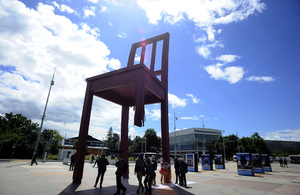UK statement at the Implementation of Council Resolution 16/18 on combating religious intolerance
Statement delivered by Ambassador Mark Matthews at the event hosted by the Universal Rights Group.

The Implementation of Council Resolution 16/18 event took place just outside the Palais des Nations in Geneva
It’s an honour to be invited to speak at this event, alongside the other member states – the US, Turkey and Pakistan – that helped craft resolution 16/18 in 2011.
We are also grateful for the contribution of Singapore, and its hosting of the conference on the Istanbul Process last year.
According to the Pew Research Centre, Singapore is the most religiously diverse country in the world. Its community relations are in many ways a model, so its role as host was very fitting.
And many thanks to the Universal Rights Group for hosting this event and for producing the report of the Singapore conference.
The UK was a keen participant in the conference, and interested in the conclusions of participants about the factors that are undermining religious tolerance globally and what can be done about it.
We are clear that resolution 16/18, and the Istanbul Process, are part of the answer, and that we need to intensify implementation around the world of the prescriptions in the twin resolutions on Freedom of Religion or Belief and 16/18.
Amongst the conclusions about factors that undermine religious intolerance, we took away the following from the conference:
First, the role of modern technology: people appear to be choosing to view more narrow, more exciting, less balanced and more extreme sources of information online – “fake news” as it is sometimes called.
Second, that education systems are inadequate to the challenge of addressing these problems.
Third, there is a dearth of tools for tackling stereotypes and misinformation.
Fourth, there are societal stresses caused by migration, fear of terrorism and exploitation of religion for political ends by state and non-state actors.
Amongst the suggestions for action to tackle religious intolerance, we took away:
One, that all states should be required to monitor religious hate crime.
Two, that countries should report to the UN what they are doing to prevent religious hate crime and promote tolerance.
Three, that the teaching of religions in schools needs to be improved.
Four, that good community initiatives need to be expanded and to be visible and publicly promoted.
We don’t need to reinvent the wheel, because the resolutions on Freedom of Religion or Belief and 16/18 already provide a framework for action and for reporting by member states to the UN.
I’d like to say a few words about what the UK has done to implement these resolutions.
In addition to strengthening our legal framework to address incitement to violence against religious minorities, we have worked with a wide range of government agencies to increase reporting, improve victims’ access to assistance, and enhance the operational response to crimes.
We were very concerned about the spike in hate crime following the referendum on our membership of the European Union. While the spike quickly receded, for those affected it wasn’t just a blip on a graph. It left people traumatised, hurt, and fearful.
We are taking robust action to address that. Our 4-year Hate Crime Action Plan will improve reporting, protect victims and target perpetrators with tougher sentencing.
It includes £1m of support for a range of projects involving young people, such as the Anne Frank Trust, which uses the inspiring story of Anne Frank’s life to educate young people about the damage caused by prejudice and hatred.
We’ve worked with Facebook, Google and Twitter to tackle vicious online abuse.
But we’re not simply content to focus on criminality; we also want to support initiatives that bring communities together.
As part of the annual Inter-Faith Week, which ran from 13-20 November 2016, we announced support for projects that unite diverse communities and different faiths.
£250,000 of small grants will fund a range of activities from cookery classes to teaching computer coding, and we’ll be supporting more Near Neighbours projects, which bring different faith groups together.
There are now more than 1,000 Near Neighbours projects across the country, and 99% of people who have taken part say they feel more connected to the local community.
We’ve seen Jewish, Muslim and Christian organisations in Leeds setting up a café where people of all faiths and none can get to know each other, while the Nottingham Liberal Synagogue has partnered with a local Muslim organisation to provide hot meals to vulnerable people.
Leadership is required from governments to defuse tensions around issues of intolerance – what better guide could leaders have than the description of the relevant rights, principles and recommended actions of the resolutions on Freedom of Religion or Belief and 16/18. I would therefore encourage all member states to support the renewal of these resolutions at the Human Rights Council in March.